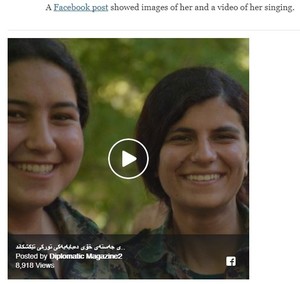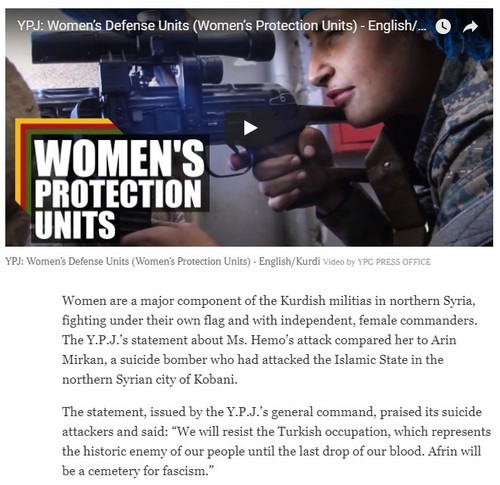A tweet posted by the influential U.S. daily New York Times regarding allegations of a terrorist from the People's Protection Forces (YPG) conducting a suicide bombing on Turkish troops in Afrin pointed to the "awkward position" of U.S. support for the terrorist group, yet their own official coverage stood just short of praising the terrorist herself.
A social media account linked to the YPG—the Syrian offshoot of the PKK, a designated terrorist group by the U.S., EU and NATO—claimed Sunday that a female militant blew herself up to prevent the advance of Turkish troops and the Free Syrian Army (FSA) fighters in the village of Hammam, some 30 kilometers southwest of Afrin town center on the border with Turkey's Hatay province. The terrorist who carried out the attack was identified as 20-year-old Zuluh Hemo, using the codename "Avesta Habur," a fighter in the ranks of YPG and PKK-affiliated Women's Protection Units (YPJ).
The area, located in the valley downstream of the Afrin River, is of crucial importance for the terrorist group to defend the low-lying areas leading to Afrin, which is an important axis of advance in the Operation Olive Branch launched by Turkey on Jan. 20 to clear the terrorist group from its northwest Syrian enclave handed over by the Assad regime in 2012. The terrorist group is expected to put up a fanatical resistance for such important routes of the operation, as it had done at the heavily-fortified Mt. Barsaya located some 50 kilometers northeast, which was captured by Turkish troops after heavy clashes and bombardment Sunday.
The YPG, re-branded as the Syrian Democratic Forces (SDF) in an attempt to persuade neighboring countries and local elements to differentiate it from the PKK terrorist group, remains the main U.S. partner in Syria despite apparent ties to the PKK. U.S. support for the terrorist group both through anti-Daesh coalition airstrikes and a massive arms and ammunition flow have enabled the terror group to control 25 percent of Syrian territory and 65 percent of the 900-kilometer (560-mile) border with Turkey.
While sharing the article regarding the incident, a surprising tweet by the NYT World account said: "An American ally, the Kurds in northern Syria, carried out a suicide attack against the Turkish military in Afrin. It puts the U.S. in the awkward position of allying with suicide bombers."
An American ally, the Kurds in northern Syria, carried out a suicide attack against the Turkish military in Afrin. It puts the U.S. in the awkward position of allying with suicide bombers. https://t.co/MBlisZPPFV
— New York Times World (@nytimesworld) January 29, 2018
 In contrast, the NYT article itself only focuses on YPG statements, even going so far as to include a video showing the terrorist singing with others, most likely intended as an emotional appeal to humanize the suicide bomber. The background of the terrorist, her birthplace, her story of how she ended up in the ranks of YPJ, were all widely covered. A YPJ promotional video also pops up on the article page.
In contrast, the NYT article itself only focuses on YPG statements, even going so far as to include a video showing the terrorist singing with others, most likely intended as an emotional appeal to humanize the suicide bomber. The background of the terrorist, her birthplace, her story of how she ended up in the ranks of YPJ, were all widely covered. A YPJ promotional video also pops up on the article page.
Whereas the links between the PKK and the YPG, and the YPJ, were only covered in the end of the article, saying that "The Turks refer to Syrian Kurdish militias by the initials of the outlawed Kurdistan Workers' Party, P.K.K. — separatists who are closely allied with the Syrian Kurds — and falsely accuse the Kurds of having an alliance with the Islamic State, also known by its Arabic acronym, Daesh." This narrative is quite contrary to the statements of U.S. authorities that have repeatedly admitted to the ties of the PKK and YPG, in addition to official U.S. documents pointing to the organic ties between the two groups.
Turkish Foreign Minister Mevlüt Çavuşoğlu was quick in reacting to NYT's reporting, saying that such an attack never took place. Other Turkish official sources have not confirmed or rejected that such an attack had taken place, but even if they confirmed the attack, it would not be the first time YPG or PKK militants have resorted to suicide attacks.
What a shame @nytimes!This story is totally baseless. The so-called event never took place. This is just another piece of manipulation by PYD/PKK. You should fact-check your stories the next time. https://t.co/esjOs5zp0L
— Mevlüt Çavuşoğlu (@MevlutCavusoglu) January 29, 2018
For a long period, the PKK had not relied on suicide bombings in its terror campaign against Turkey, but used suicidal assaults on security forces in addition to bombings both on military and civilian targets in urban areas and massacres of civilians in villages in eastern and southeastern Turkey.
Since the end of the reconciliation process between the Turkish government and the PKK in July 2015, the nature of PKK attacks has vastly changed due to its experience in the Syrian civil war. While PKK militants had turned civilian areas and entire towns into battle zones to shield themselves behind locals, a string of suicide attacks were carried out in Turkish cities, all claimed by PKK's other affiliates to mask association with the terrorist group.
Along with other groups, YPG militants resorted to a vast number of suicide attacks fighting the Daesh terrorist group in Syria, partly due to the fact that they would be expediently executed by Daesh militants if they were to be captured alive.

PKK-related suicide attacks in Turkey were often claimed by a group titled Kurdistan Freedom Hawks (TAK), which is identified as a hawkish split-off of the PKK, as if the PKK distances itself from violence, attacks and bombings.
The first of such suicide bombings occurred May 22, 2007, in Ankara's busy Ulus neighborhood, killing 9 civilians and injuring more than 120 others. Another one was on Oct. 31, 2010, in Istanbul's Taksim Square, injuring 32 people, including 15 police officers.
However, the number of suicide attacks skyrocketed in 2016, at the height of renewed fighting between Turkish security forces and PKK terrorists. On Feb. 17, 2016, a TAK-affiliated militant detonated his vehicle right across the Turkish General Staff in Ankara, killing 29 people, including a civilian, 14 civilian employees of the Turkish Armed Forces and 14 soldiers in shuttle buses. While TAK claimed the attack, Turkish authorities stated that the militant Abdülbaki Sömer was trained in YPG-controlled areas in northern Syria and crossed to Turkey before carrying out the attack.
A month later on March 13, an explosive-laden vehicle was detonated at the busy bus stops in Ankara's Kızılay Square, killing 37 civilians and injuring 120 others. TAK again claimed the attack, but it was revealed that the perpetrator of the attack was again trained by YPG in northern Syria.
Another suicide car bombing claimed by TAK occurred June 7, 2016, as another explosive-laden car was detonated in Istanbul, killing six police officers and six civilians and injuring more than 50 people.
On Dec. 10, 2016, two suicide bombers, one inside an explosive-laden vehicle, blew themselves up near Vodafone Park in Istanbul's Beşiktaş district, killing 38 police officers who were providing security after a football match and eight civilians and injuring more than 160 others.
Another suicide car bombing targeting soldiers in Kayseri province killed 14 off-duty soldiers and injured 60 others.
It is important to note that these incidents are only the large-scale attacks categorized as apparent suicide attacks, in addition to dozens of smaller attacks used in clashes with security forces in rural areas.
Throughout this period, the U.S. was actively supporting a terrorist group using suicide bombings. Its assistance was made especially apparent as security experts announced dozens of times that the plastic explosives used in the bombings were not regular materials that could be obtained easily from underground arms markets in the Middle East, indicating foreign origin of the terrorists' supplies.
However, these attacks and its connections to the YPG must have been ignored by the NYT so that they come to the conclusion of a YPG militant targeting a NATO ally for the first time.